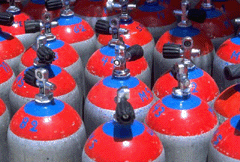| Ch 1. Basics | Multimedia Engineering Fluids | ||||||
|
Mass Density |
Ideal Gas Law |
Viscosity |
Surface Tension |
Vapor Pressure |
|||
| Ideal Gas Law | Case Intro | Theory | Case Solution |
| Chapter |
| 1. Basics |
| 2. Fluid Statics |
| 3. Kinematics |
| 4. Laws (Integral) |
| 5. Laws (Diff.) |
| 6. Modeling/Similitude |
| 7. Inviscid |
| 8. Viscous |
| 9. External Flow |
| 10. Open-Channel |
| Appendix |
| Basic Math |
| Units |
| Basic Fluid Eqs |
| Water/Air Tables |
| Sections |
| eBooks |
| Dynamics |
| Fluids |
| Math |
| Mechanics |
| Statics |
| Thermodynamics |
| ©Kurt Gramoll |
|
|
||||||||||||||||||||||||||||||||||||||
|
Table: Gas Constants for the Problem
|
The conditions of the gases are given as follows:
The mass of each gas can be determined by the ideal gas law: m = pV/RT m = (1000)(0.25)/(0.2598)(290) For nitrogen, the gas constant R is 0.2968 kJ/kg-K. The mass of the nitrogen in a single tank is m = (850)(0.25)/(0.2968)(290) For carbon dioxide, the gas constant R is 0.1889 kJ/kg-K. The mass of the carbon dioxide in a single tank is m = (1,250)(0.25)/(0.1889)(290) = 5.705 kg The total weight of the tanks is then given by Wtotal = weight of empty tanks + weight of gases |
|||||||||||||||||||||||||||||||||||||
Practice Homework and Test problems now available in the 'Eng Fluids' mobile app
Includes over 250 free problems with complete detailed solutions.
Available at the Google Play Store and Apple App Store.
